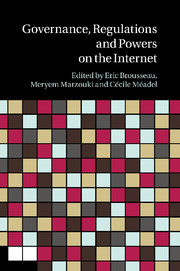Crossref Citations
This Book has been
cited by the following publications. This list is generated based on data provided by Crossref.
2013.
The Internet and its Governance: A General Bibliography.
Revue française d’études américaines,
Vol. n° 134,
Issue. 4,
p.
20.
Calderaro, Andrea
and
Kavada, Anastasia
2013.
Special Issue on “Online Collective Action and Policy Change”.
Policy & Internet,
Vol. 5,
Issue. 1,
p.
1.
Bradshaw, Samantha
DeNardis, Laura
Hampson, Fen Osler
Jardine, Eric
and
Raymond, Mark
2014.
The Emergence of Contention in Global Internet Governance.
SSRN Electronic Journal ,
Bauer, Theresa
2014.
Communicating Corporate Social Responsibility: Perspectives and Practice.
Vol. 6,
Issue. ,
p.
259.
Bauer, Theresa
2014.
Communicating Corporate Social Responsibility: Perspectives and Practice.
Vol. 6,
Issue. ,
p.
259.
DeNardis, Laura
and
Musiani, Francesca
2014.
Governance by Infrastructure: Introduction, 'The Turn to Infrastructure in Internet Governance'.
SSRN Electronic Journal,
Bauer, Johannes M.
and
Obar, Jonathan A.
2014.
Reconciling Political and Economic Goals in the Net Neutrality Debate.
The Information Society,
Vol. 30,
Issue. 1,
p.
1.
Francesca, Musiani
2015.
Giants, Dwarfs and Decentralized Alternatives to Internet-based Services: An Issue of Internet Governance.
Westminster Papers in Culture and Communication,
Vol. 10,
Issue. 1,
p.
81.
Bradshaw, Samantha
2015.
Rethinking Trust in Internet Governance.
SSRN Electronic Journal,
Musiani, Francesca
2015.
Practice, Plurality, Performativity, and Plumbing.
Science, Technology, & Human Values,
Vol. 40,
Issue. 2,
p.
272.
Musiani, Francesca
2015.
Nains sans géants.
p.
253.
Musiani, Francesca
2015.
Les architectures P2P.
Réseaux,
Vol. n° 189,
Issue. 1,
p.
47.
2015.
Abécédaire des architectures distribuées.
p.
225.
Bradshaw, Samantha
DeNardis, Dr. Laura
Hampson, Fen Osler
Jardine, Eric
and
Raymond, Mark
2015.
The Emergence of Contention in Global Internet Governance.
SSRN Electronic Journal,
Raymond, Mark
and
DeNardis, Laura
2015.
Multistakeholderism: anatomy of an inchoate global institution.
International Theory,
Vol. 7,
Issue. 3,
p.
572.
De Filippi, Primavera
and
Loveluck, Benjamin
2016.
The invisible politics of Bitcoin: governance crisis of a decentralised infrastructure.
Internet Policy Review,
Vol. 5,
Issue. 3,
Duberry, Jerome
2017.
ICT in Health and Finance Global Governance Institutions.
SSRN Electronic Journal,
Hacker, Philipp
2017.
Corporate Governance for Complex Cryptocurrencies? A Framework for Stability and Decision Making in Blockchain-Based Organizations.
SSRN Electronic Journal ,
Anciaux, Arnaud
Farchy, Joëlle
and
Méadel, Cécile
2017.
L’instauration de droits de propriété sur les données personnelles : une légitimité économique contestable.
Revue d'économie industrielle,
p.
9.
Zeng, Jinghan
Stevens, Tim
and
Chen, Yaru
2017.
China's Solution to Global Cyber Governance: Unpacking the Domestic Discourse of “Internet Sovereignty”.
Politics & Policy,
Vol. 45,
Issue. 3,
p.
432.





